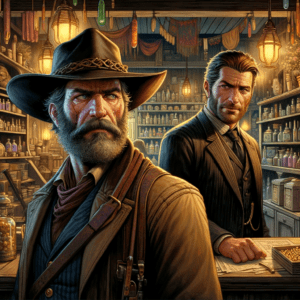
I sit in the silent study of my supposed parents’ house, the walls lined with books that seem to gaze down at me with a mixture of reverence and pity. It’s here, in this sanctuary of leather-bound tomes and the musky scent of paper, that I find myself at the precipice of my past and future. The air is still, as if holding its breath for my next move.
I’ve been orphaned, or again possibly, I am not sure. Mother and Father have departed this world within a fortnight of each other, leaving me adrift in a sea of erudition they charted for me. The wooden box sits on the mahogany desk before me—its carvings intricate, its contents unknown. Father, gave it to me on my sixteenth birthday, his eyes clouded with an emotion I couldn’t decipher. “This is yours now,” he had said, his voice trembling like a leaf in the wind.
“Yours”. The word now feels like a cruel joke as I turn the box over in my hands. Everything is mine now, all “Your’s”, only daughter of the late Arthur and Margret Dropwater.
I spent the morning amidst the ghosts of my childhood, sorting through Mother’s gowns and Father’s suits. Each article I touched whispered of times long gone, echoes of laughter and whispers of despair. The task is a solemn one, yet necessary, for the house must be cleared. It stands a mausoleum to lives once lived, now just shadows flitting across my memory.
In the afternoon, I ventured into the world of ledgers and contracts, a landscape as foreign to me as the dark side of the moon. Father’s associates eyed me with a mixture of curiosity and condescension as I sat at the head of the long table that dominated his study. Their gazes bore into me like drills, but I met them with the steel I’ve learned to summon from within.
They spoke of railroads and steel, investments in lands far west—places I’d only read about in books. I nodded where it seemed appropriate, asked questions when gaps in my understanding yawned too wide to leap across. It was a dance as intricate as any social call, each step measured, each word weighed for its impact.
After the meeting I stayed in the office, intent to remove some of my fathers possessions, as I went to do so, I felt a surge of melancholy so potent it threatened to sweep me away. This house, once so full of life, now stood as an empty vessel—like me. I began to go through the meticulous records and correspondences that spoke of lands, transactions, and social engagements. Nearing the end of bottom draw of Father’s desk lay an inconspicuous envelope —a whisper among declarations.
The seal was broken long ago, its contents familiar to the touch of others before it came to me. I unfolded the brittle paper with a care reserved for sacred relics, and as I read, a coldness settled in my chest. Words not meant for my eyes revealed the artifice of my existence: I was not born a Dropwater.
A tempest of emotions swirled within me—betrayal, grief, confusion, a gnawing hunger for truth. Yet amidst this inner turmoil, a chilling clarity took root. These letters were poison to the life meticulously cultivated for me. They could unravel everything—my status, my claim to the Dropwater legacy. Knowledge was power; it was also a curse.
With each re-reading, the words seemed to burn brighter on the page: “We must ensure she never learns of her true parentage…” My hands trembled as I held evidence of a life that might have been—should have been—mine by blood and birthright.
I should be incensed by their deception, yet what vexed me more was this gnawing sense of betrayal toward those who raised me. They had given me love, an education—their name. Could I condemn them for wanting to protect me from a truth that would have offered no solace?
I placed the letter within my garments and took it with me, for now, it is simply a piece of a puzzle that lacked edges; undefined and vast in their implications. My inheritance hung in the balance on the tip of discretion’s blade. As much as it pained me to don this mask woven from lies and omission, survival demanded nothing less. One thing I did notice however, is the post mark, from a place called Demomire.
My parents—no, the people I once believed were my parents—never spoke of such a place. Did they know it held the roots of my existence? Was their silence a protective shroud or a barrier to keep me from the truth?
I continued to rummage around the dust-laden volumes and half-forgotten annals of my father’s study, a revelation lay hidden like a gem amidst rubble. There, nestled within an unassuming journal on colonial establishments, I stumbled upon the existence of the Demomire Library. The entry spoke of a citadel of knowledge, as formidable in its intellectual might as it was in its stone-clad stature—a bastion for the minds yearning to be unfettered from the shackles of ignorance.
How had such a place eluded my voracious appetite for learning? My years spent under the tutelage of esteemed professors and amidst the towering shelves of New York’s grandest libraries had never hinted at Demomire’s trove of wisdom. It was as if the library was a secret, whispered only among a select few deemed worthy.
I penned a letter on impulse, an invisible thread pulling me toward this mysterious heartland of scholarship. My missive traversed distances unknown, borne by an urgency that mirrored the palpitations of my own heart.
The reply from Fiona Gant arrived with unnerving alacrity, its contents now resting beside this very journal. As I pore over her words once more, the notion of Demomire shifts from an enigmatic idea to a concrete sanctuary where history’s whispers may hold communion with my quest for identity.
The library’s history is as enigmatic as its founder, Prince Leopold George Rákóczi. A gift to Demomire, this fortress of enlightenment rose from his ambition to seed the wilderness with wisdom. How could such a monumental figure in academia and such an edifice dedicated to knowledge escape my cognizance?
The gravity of what awaits me in Demomire weighs heavily upon my chest. Tomorrow, as I take my leave from this mausoleum of pretense, I will sever ties with an existence woven from half-truths and fabrications. With each passing league between myself and this house of masquerades, may I inch ever closer to unveiling my reality.
As night falls and shadows play upon these walls that once felt like home, I realize that tomorrow I depart not just from this house but from an identity that was never truly mine. With each mile that separates me from this life built upon deception, may I draw closer to the truth—whatever that may be.
Rose





